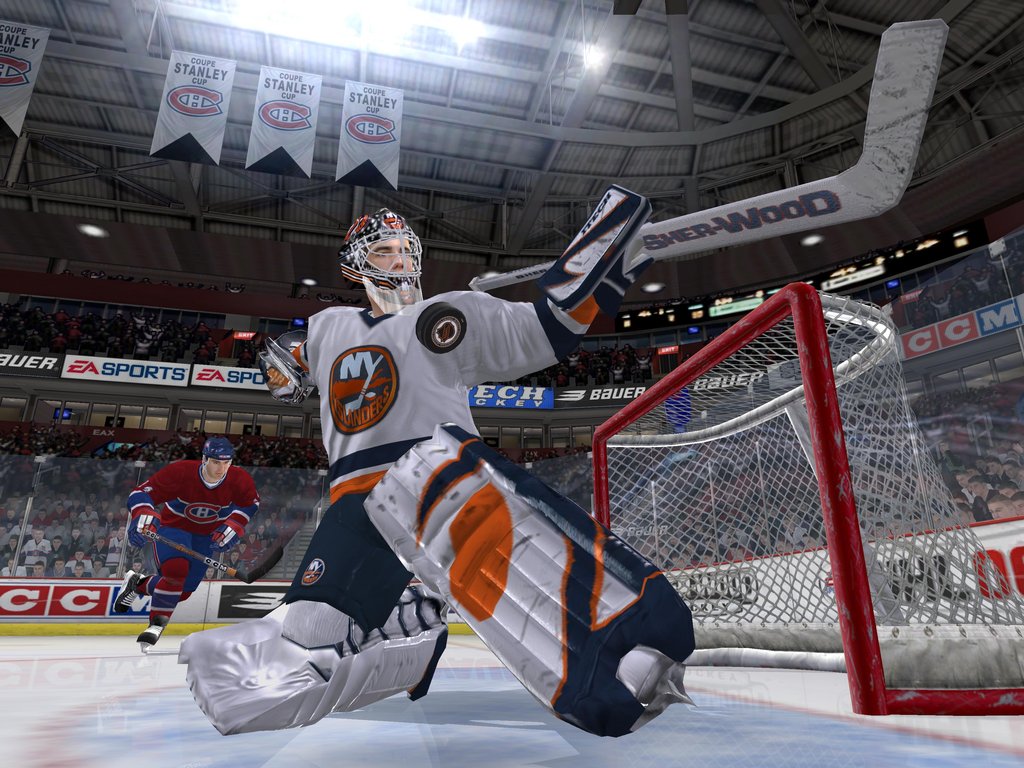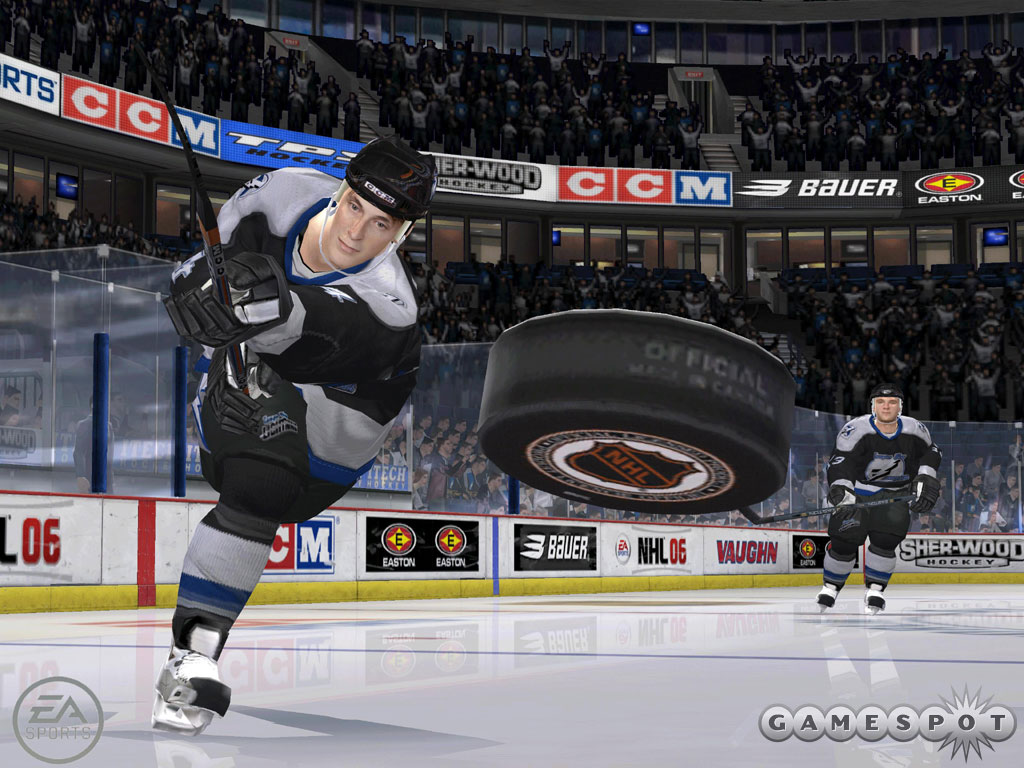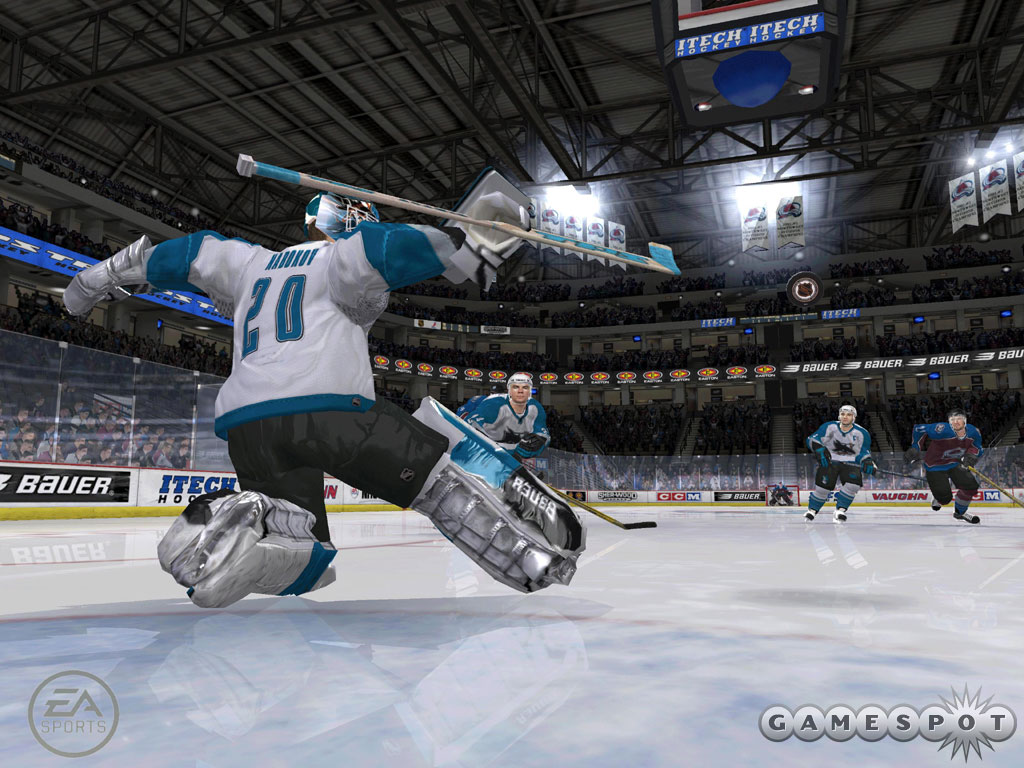Last year, EA's NHL franchise took something of a misstep with NHL 2005. Despite being a generally good game of hockey, some gameplay problems, a somewhat lacking dynasty mode, and a few other scattered problems cost the series the momentum it had built the previous year with the thoroughly excellent NHL 2004. For this year, and for the triumphant return of the NHL from its ugly player lockout, EA has righted a couple of wrongs, left some other wrongs as they were, and tossed in a couple of new ones. NHL 06 doesn't feel like much in the way of forward progress at all, really, as it simply tweaks things that probably needed bigger overhauls and leaves an awful lot of the package generally untouched. Sure, it's got all the new rule changes, as well as an almost entirely up-to-date roster, but considering how similar the game is overall to 2005's version, you have to ask yourself, "Is that really enough?"

Gameplay-wise, NHL 06 plays a lot like the last few games in the series have by focusing on a faster, more furious brand of play that can't exactly be called realistic but manages to be fun, regardless. The game can be controlled via keyboard and mouse, or with a gamepad, but like previous NHL games, the way you should be playing this is with a gamepad. The keyboard and mouse control just sucks. Mechanically, all the changes made last year are back once again, including two-button shooting and the easy one-step wraparound shot. One thing that isn't back is the overwrought defensive artificial intelligence that made setting up offensive plays a gigantic pain in the neck. The defensemen in NHL 06 actually do things like poke-check and play you up close without necessarily hip checking you to the ice every time you cross the blue line into the offensive zone. Sure, they'll still knock you back, given the opportunity, but thankfully, those opportunities aren't nearly as plentiful in this year's game, giving you more chances to play realistic offense. That isn't to say the balance is perfect, mind you. On the default difficulty, we found it a little too easy to exploit certain one-timers and fancy shots--though to be fair, that wasn't so much the fault of the defensemen so much as it was the fault of the goalie, who for some reason finds it necessary to drop to the ice sideways at rather bizarre times. But once we bumped the difficulty up to either of the upper two levels, that issue went right away.
Beyond less-crazy defensive AI, the developer has put in a couple of new goodies in the form of left-analog deking and right-analog shooting. The left-analog deking is pretty self-explanatory. You simply move the left analog stick back and forth as you're moving up the ice to try to fake out defenders and goaltenders. It takes a little getting used to, as you essentially have to hold the stick forward and press it side to side at the same time. But once you get a handle on it, it works nicely. The right-analog shooting is a feature designed for those special forwards and offensive defensemen who love faking out goaltenders with lots of fancy skate work. Essentially, by pressing a direction on the right stick, the player with the puck will do some kind of 360 spin or crazy between-the-legs fake-out that only a true superstar could pull off without breaking his ass on the ice. And that's the thing of it, really. Only superstar players (who are ever-so-subtly denoted by a big fat star icon whenever they're selected) can really pull these moves off with any effectiveness, and even they need a little bit of breathing room to be successful. So don't expect to be doing any goofy spin moves with a burly defenseman all up in your face.
Both the flashy scoring moves and left-analog deking are nice additions to the package, but neither is anything you could exactly call game-changing. Sure, they're fun, but they stick pretty closely to the mantra that seems to be the overlying theme of the whole game: style over substance. Again, it's tough to really call NHL 06 a simulation hockey game, as it plays so fast, and it's too easy to score fairly high numbers of goals once you get a handle on the defensive tendencies. Not to mention that it's still supereasy to do things like, say, control defensemen all the way down into the front of the net, have a shot saved and passed back to an opposing player, and still not suffer defensively--as some random forward will magically find a way to play defense just as well as the defenseman you stranded in the offensive zone. Additionally, the game totally overuses the "hero lines," which often consist of ridiculous scoring troupes that put forwards in defensive positions...to the point where they're on the ice for a third of the game (unless you pick manual line changes). Still, the style of the game works to its advantage, too, as it does make for an exciting method of play, and it's not as though you can't play the game strategically at all. There are plenty of opportunities to set up proper one-timers and power plays. It just isn't the most realistic game you'll find on the market currently.

While the game does offer great (if familiar) gameplay, on the features front it's a bit lacking. Mainly, there really isn't any one big, new feature in this year's game. The dynasty mode, for example, feels pretty much like a carbon copy of last year's dynasty, warts and all. You still have to deal with restrictive owner goals set for you at the outset of each season, and said goals still play into the team's perceived business philosophies. Teams like the Devils and the Avalanche want to get deep into the playoffs so they can eventually win the Stanley Cup, whereas stingier clubs like the Blackhawks want the number one overall pick (yet, for some reason, the Hawks don't care who you take with said pick) and a high profit margin. In the non-salary-cap era of hockey, these designations for teams made a little more sense, but since free agency began, some of these stingier clubs have started spending money on real free agents, and conversely, some of the biggest spenders have been picked relatively clean and didn't bother to make up for their losses. Granted, nobody would expect EA to completely scrap its franchise design only a few months before release, but those are the breaks when you don't bother to deviate from what was an overly restrictive design to begin with.
Other old problems remain unfixed as well. The game still doesn't notify you when you have new messages via the mode's e-mail system, even if it's something important like an injury or a trade offer. So unless you stop the simulation to go check your e-mail constantly, you'll miss out on important stuff (made all the more infuriating because the game's single season mode actually does interrupt simulations for notices). There's also still not much of an offseason progression here. No specific callouts of the draft or the beginning of free agency exist beyond single e-mails letting you know what dates on the calendar signify each (the calendar itself displays no hints as such). And in either event, your participation is minimal. You still don't really have to scout rookies at all (and depending on how much upgrade money you spend on scouts, varying degrees of reliable rookie info will be available at your fingertips on draft day), and you can still cherry-pick the best free agents on July 1, as no player stops to entertain other offers. Also, there's no salary cap at all in the dynasty mode, and there's not even a hard team budget. So unless your owner has specific concerns about team salaries, you can just go buck wild with player signings.
With that said, all the good features from last year's dynasty are back again, too. The team-upgrades system is intact, letting you gradually improve off-ice coaching and the financial components of your club. Also, the whole chemistry system is back again this year. Players are still divided into categories of scorers, playmakers, and grinders. And just like before, splitting up different types of players among lines nets the biggest boosts. Fortunately, this year the CPU does a better job of distributing your players across different lines should an injury pop up, and you won't see as many marquee players getting relegated to fourth-line status. There is one odd glitch with lines, though: When you first sign a new player to the team and then dress him, sometimes you'll find the CPU went nuts and assigned him to about five different lines at once, sometimes making him the only player on a line. It's a problem that's easy enough to fix, but it's kind of bizarre.

Speaking of bizarre issues, there's one big new problem in the dynasty mode that wasn't present last year. Specifically, it relates to the scheduling of games. What happens is that whatever schedule you're given your first year ends up being the exact same game schedule you get every year. If you play against the Sharks in your first game and the Blues in your last game, that will be the case every year, as will every other game in between. Not to mention that we found ourselves playing a lot of the same playoff opponents over and over again, at one point playing against Calgary in the finals three years straight. While that's only somewhat of a leap, having the exact same schedule every single year is simply an impossibility, and it's clearly just some kind of glaring oversight.
The online play is pretty much in the same boat as the dynasty mode. Before you can get to any of the fancy online menus or lobbies, you have to register with the EA Sports online service (and either pay $2 to EA or let ESPN spam your e-mail account, which is, you know, gross). Once you get past all that nonsense, it's fundamentally the same online experience as most other EA Sports games on the PC. You can access lobbies, clubs, tournaments, and tracked stats for your profile across all games. All told, it's a pretty by-the-book online mode, but it does at least perform better than last year's game.
In terms of other features, NHL 06 runs the usual gamut of international teams, providing a world league tournament, three elite leagues, the free-4-all minigame (which is completely untouched from last year and still can't be played online), create-a-player and create-a-team options. It's basically the same roster of modes from last year, sadly, and the playable version of NHL 94 that was on the PlayStation 2 version of the game isn't available on PC.
The NHL franchise has always included slick presentational values, and NHL 06 is no exception. The graphical models for players have changed somewhat, as they now more accurately depict the size differences between larger defensemen and enforcers, as well as smaller, speedier scorers. The one adverse effect that these changes seem to have had is that all the players, specifically when playing the game (as opposed to cutscenes), look a little more squat than they used to. It's not that they look bad at all, necessarily, but there's something just a bit off about each player that makes him seem a bit stubbier than in recent years. Up close during cutscenes you don't really notice this as much, so maybe it's a camera perspective thing. Anyway, the on-ice action still looks great. The ice is beautifully reflective and deforms, and the new animations, specifically the new scoring moves, look fantastic. There are some occasional animation hiccups where players will get stuck along the boards or against the net for a few seconds, but apart from that, everything on ice looks pretty seamless. The PC version of the game is actually not an awful lot better-looking than the Xbox game. It's crisper, for sure, but in terms of graphical detail, there isn't much more here than in the top console game.

The audio experience of NHL 06 is on the same level as 2005. There are great on-ice sound effects, and there's periodically useful, but mostly overwrought and nonengaging, commentary from the same twosome that's handled the commentary for the last few years, Jim Hughson and Craig Simpson. Additionally, more rock-based EA Trax tunes make up the soundtrack, which includes artists like Fall Out Boy, American Head Charge, OK Go, and Pennywise. None of the music exactly stands out, but it's all fine menu-screen fodder.
Fans of EA's brand of hockey will undoubtedly take something positive away from NHL 06, but even they will find it hard to deny that the game isn't everything that it could have been. 06 just doesn't do anything significant for the franchise, as it just adds some ancillary features that are neat to have but don't ultimately change the face of the game, leaving some of the most important (and, in some cases, most flawed) aspects of it practically in stasis. It's good hockey, but it's not great hockey. And even though there aren't exactly a lot of choices available for PC-owning hockey fans, you still might want to carefully consider if this year's iteration is really worth the money.